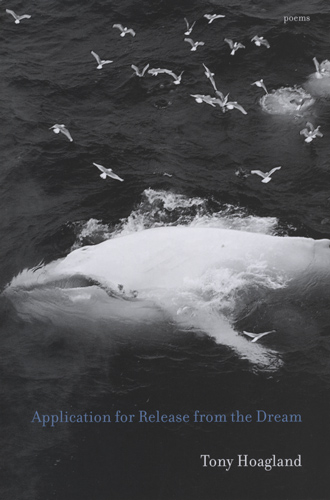Application for Release from the Dream
Tony Hoagland has been high on the list of established poets for years. The great thing about his poetry is the way he takes simple vocabulary and channels it into something amazing or disquieting or droll. He frequently writes what the rest of us might be thinking. In his latest book, Application for Release from the Dream, he demonstrates this in the poem “His Majesty.” Tony Hoagland has been high on the list of established poets for years. The great thing about his poetry is the way he takes simple vocabulary and channels it into something amazing or disquieting or droll. He frequently writes what the rest of us might be thinking. In his latest book, Application for Release from the Dream, he demonstrates this in the poem “His Majesty,” which zeroes in on the driver of a jeep whose radio is blaring at 2 a.m.:
I bet I’m not the only one to hope his vehicle might flip
at the zigzag bend of the canal
and toss him headfirst in the swamp,
Hoagland, who teaches at the University of Houston and in the low residency MFA program at Warren Wilson College, is at a time in life when age enters into many of his works. “Crossing Water” is an example:
Each time I make the trip, I get the strange idea that this
is what is waiting at the end of life—long stalks slanting in the breeze, then straightening—
flowers, loose-petaled as memory, grayas the aftertaste of grief.
Elsewhere, he begins “Fetch” this way: “Who knew that the sweetest pleasure of my fifty-eighth year / would turn out to be my friendship with the dog?” Another poem, “Aubade,” continues to mention age; a sweet love poem with a punch line:
but also, we are getting older.
Come over here, darling,and put your hand on my head
and tell me if you think this is a tumor.
Besides aging, Hoagland frequently incorporates famous people, either quoted or otherwise noted, like in “Eventually the Topic”: “‘Human beings weren’t meant to live like this,’ said Aldous Huxley, / but what did he mean by this? and how do you define meant?” Reclusive artist Joseph Cornell and Virginia Woolf make appearances in “The Edge of the Frame.” Dizzy Gillespie, Cesar Chavez, and James Dean are also fittingly woven into poems.
Hoagland also gives the commonplace a twist, as in these first lines from the book’s title poem: “This is my favorite kind of weather, this cloudy autumn-ness— / when long wool coats make shoplifting easy.”
The tone turns serious in homages to Dad, this one called “Wine Dark Sea”:
At Christmas I’ll send him a case of grapefruit.
When he dies, I’ll fly to the funeral
with a whole unpublished text inside me,
Yet another mood, happiness, or the “hallucination of happiness,” plays in “Please Don’t,” and again in “Airport”: “In the airport the fat sunburned people coming back from vacation / look happier than anyone, with their Hawaiian shirts and varicose veins / and faint aroma of suntan lotion. // I look down on them because their happiness is so superficial.”
Finally, two items worth noting: Don’t miss the tidy little surprise that awaits mid-book with a rework of William Carlos Williams’s “The Red Wheelbarrow,” and the spectacular cover of Application for Release from the Dream. It’s a photo of a rare white humpback whale taken by maritime engineer Dan Fischer while on a boat trip off the coast of Norway.
In addition to this fifth book of poetry, Hoagland has two books of essays to his credit, one with the intriguing title Twenty Poems That Could Save America and Other Essays. In a blog post about that book on Harper’s Magazine site, Hoagland urged revisions to the selection of poetry taught in schools, though his recommendations are applicable in all settings. “ . . . we need [poetry’s] plaintive truth-telling about the human condition and its imaginative exhibitions of linguistic freedom, [ . . . ] We need its previews of coming attractions: heartbreak, survival, failure, endurance, understanding, more heartbreak.” Application for Release from the Dream is an ideal instrument to begin fulfilling that need.





